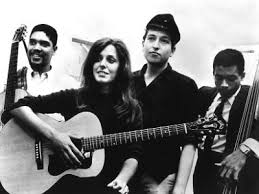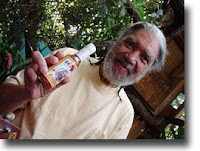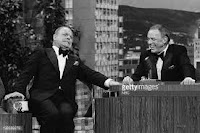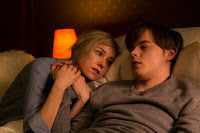Demme personified a sort of detached cool irony, an attitude signified by the tightly-buttoned collar look he shared with two other key ironists of the Eighties, the Davids Lynch and Byrne. If Demme's haircut seemed borrowed from Lynch's Eraserhead, his hipster heart was certainly defined by the film which many fans defined as their favourite, the Talking Heads' Stop Making Sense. That audience is often less impressed with what was Demme's greatest film, The Silence Of The Lambs. He may have drawn this harder edge from the beginnings of his directing career, not with art house indy fare, but working for the B-movie schlockmeister Roger Corman, who gave directing breaks to the likes of Steven Spielberg, Francis Ford Coppolla, Joe Dante and John Sayles. Demme's films for Corman are knowing pieces of exploitation which give their casts free rein to make the most of their material.
Fighting Mad was the third of his Corman flicks; the first, Caged Heat, a women-in-chains movie before Orange Is The New Black made those hip, had music by John Cale, but the best of the three was the
 second, Crazy Mama. It had an inspired performance by Cloris Leachman, and was the only one of the three Demme didn't write; Robert Thom's screenplay (story by Frances Doel) is more original and offbeat, and less formulaic than Demme's two. Leachman is over the top as a beauty parlour owner who loses her salon and embarks on a crime spree; the commentary on Seventies America, its economy and morals, is plain even though the film, which echoes the Thirties and Ma Barker, is set in 1958 and boasts a great Fifties soundtrack.
second, Crazy Mama. It had an inspired performance by Cloris Leachman, and was the only one of the three Demme didn't write; Robert Thom's screenplay (story by Frances Doel) is more original and offbeat, and less formulaic than Demme's two. Leachman is over the top as a beauty parlour owner who loses her salon and embarks on a crime spree; the commentary on Seventies America, its economy and morals, is plain even though the film, which echoes the Thirties and Ma Barker, is set in 1958 and boasts a great Fifties soundtrack.He followed those up with the much overlooked Citizen's Band (aka Handle With Care) written by Paul Brickman. Demme did off-beat well, and he was brilliant with actors who underplayed such parts. Paul Le Mat and Candy Clark from American Graffiti; Bruce McGill from Animal House and Roberts Blossom from just about every B movie in the 70s (and Gatsby's father in The Great Gatsby) all shine in a movie that speaks to the growing dislocation of the 'Me Decade'. After a nod to Hitchcock via Roy Scheider and Last Embrace, in which Scheider's obsessive search for his wife's assassin prefigures Silence Of The Lambs, he made Melvin And Howard (1980). Langhorne again did the music; his proto-Americana perfectly marking the dissolution of the American Dream in the Nevada desert. Last week when I was discussing Warren Beatty and Howard Hughes on BBC Radio 4's Front Row, I hadn't had a chance to mention Bo Goldman's screenplay (Goldman is the only other writer credited with Beatty on Rules Don't Apply) and those dread words 'American Dream'. Paul LeMat was superb again as Melvin Dummar, Jason Robards is one of the best screen Hugheses, and Mary Steenburgen won an Oscar for what is basically the Candy Clark role. It's one of the more important films of the end of the Seventies, as they melded into the Eighties.
To this point, Demme's career seemed to be following an arc, but his next feature, Swing Shift, wouldn't appear until 1984. Around that time I met Ed Saxon, Demme's producer, who was a friend of my LA friend Steve Berman. I remember Saxon talking about Demme's love of music, not just Talking Heads but much more. He made some music videos and did a little TV, a pattern which would continue throughout his career. He may go down as the greatest of the rock film makers. Then came the off-beat success of Something Wild (86) and the lighter Married To The Mob (88), and he also did the Spalding Gray monologue Swimming To Cambodia. But none of this prepared us for The Silence Of The Lambs (1990).
 Silence won five Oscars, and deservedly so. I wrote about the movie's approach when I reviewed the book's 25th anniversary edition (link here) and how Demme recognises the book is about Starling, and makes her central to its tensions, but as he had done right back to his Corman days, he also allows Hopkins and Lecter to steal the show. Hopkins' performance comes close to Lecter as hipster; he's poised like a dancer, moving in delicate, precise steps. Deme gets the way Harris used characters to reflect aspects of Lecter, just as Lecter jumps on aspects of those characters for his own devices, the most important of those being his effort to get Starling to recognise and nurture her inner serial killer; her empathy is like Will Graham's in Red Dragon (even better in Michael Mann's version Manhunter), but she's strong; her malleability was the weakest part of Silence's sequel. And Demme gets wonderful performances from supporting players, most notably Scott Glenn as Jack Crawford and Anthony Heald as Dr Chilton.
Silence won five Oscars, and deservedly so. I wrote about the movie's approach when I reviewed the book's 25th anniversary edition (link here) and how Demme recognises the book is about Starling, and makes her central to its tensions, but as he had done right back to his Corman days, he also allows Hopkins and Lecter to steal the show. Hopkins' performance comes close to Lecter as hipster; he's poised like a dancer, moving in delicate, precise steps. Deme gets the way Harris used characters to reflect aspects of Lecter, just as Lecter jumps on aspects of those characters for his own devices, the most important of those being his effort to get Starling to recognise and nurture her inner serial killer; her empathy is like Will Graham's in Red Dragon (even better in Michael Mann's version Manhunter), but she's strong; her malleability was the weakest part of Silence's sequel. And Demme gets wonderful performances from supporting players, most notably Scott Glenn as Jack Crawford and Anthony Heald as Dr Chilton.His next film was a fascinating documentary Cousin Bobby, about his cousin who was a preacher in Harlem. The following year came Philadelphia, a big star film that was a change of pace but somehow less satisfying. It's again a showcase for the actors, though I keep thinking Tom Hanks and opera risked playing to gay cliches. The odd thing about Philadelphia is that one of its two Oscars was for original song, Bruce Springsteen's 'Streets Of Philadelphia'. As they do so often, the Academy voters seemed swayed by fame; Springsteen's isn't even the best original song in the movie; Neil Young's 'Philadelphia' deserved the statue. It's interesting that Demme would go on to make two documentary films with Young.
In the 24 years since Philadelphia, Demme made only six feature films, two of which were remakes much less successful than their originals, The Truth About Charlie and The Manchurian Candidate. He made Wallace Shawn's adaptation of Ibsen, A Master Builder, completing his set of the stars of My Dinner With Andre. His last feature was a music movie, Ricki and The Flash, which might have been more interesting with Cloris Leachman in the Meryl Streep role.
Demme's legacy ought to revolve around Silence Of The Lambs, and I think somehow Melvin And Howard will be revived. But his legacy may equally be his devotion to music, to making films about music or musicians he loved; to his willingness to step away from feature films to make documentaries (I particularly like Jimmy Carter: A Man From Plains, where the plain bit contrasts nicely with the style, and The Agronomist, about the Haitian activist Jean Dominique); and maybe even to the jobbing work of television, to which he occasionally brought that eye that was so evident when he churned out B films for Corman. I think of Philadelphia, in many ways, as a musical documentary. I admire the scores of many of Demme's films, probably more than the extended length music films themselves. But he was a rare and many faceted talent. RIP



























